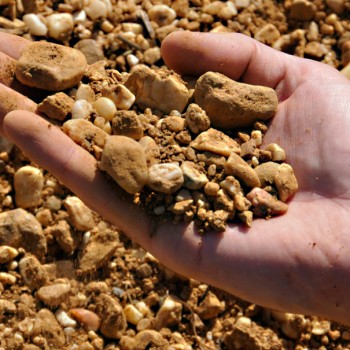New study strengthens case against soil-based minerality
Date£º
2015-10-14 21:26 Source£º
thedrinksbusiness Author:
Darren Smith Translator:
A new study has provided further evidence that the perception of minerality in wine is not linked to soil.

Minerality is one of the wine industry's most controvertial subjects. While most people agree that there is no diret mechanism for the uptake of mineral flavours from soil to vine, such a link continues to be implied by many wineries (Photo: Wikipedia)
A link between soil and mineral flavours in wine continues to be suggested by many winemakers, particularly in the Old World£®
The findings emerged from the second part of a two-year research project, titled ¡®Minerality in Wines¡®, conducted by Spanish wine analysis company Excell Ib¨¦rica and Outlook Wine.
The results of the study indicate that the chemical composition of wines and their perception as ¡®mineral¡¯ are not directly linked to the minerals in a vineyard¡¯s soil.
Rather, a variety of volatile chemical compounds derived from the metabolism of the vine, the fermentation of yeast and bacteria, as well as from techniques applied in the winemaking and ageing processes, were found to be responsible for the perception of minerality.
Identificatory cues also played a significant part in the identification of minerality.
The first part of the study, ¡®Chemical Bases of Mineral Character at Olfactory and Gustatory Level in White and Red Wines¡¯, identified a number of chemical compounds in 17 wines which were considered to be representative of minerality.
The second part of the study involved the consistent identification of these compounds in a series of synthetic wines in directed and non-directed blind tastings.
The tastings were performed by two qualified tasting panels, one made up of winemakers and another by wine sector professionals.
¡°Both in the olfactory phase of the research as in the gustatory phase, the selected tasters coincided in the identification of certain elements allowing [us] to define the term mineral in the samples, but not all of them from parameters linked to the soil,¡± the researchers explained.
¡°The main conclusion challenges the popular belief that it¡¯s the characteristics of the soil ¨C where vines and grapes grow ¨C which provide a higher concentration of minerals, those being responsible for the sensory minerality of wine.¡±
The study also concluded that the descriptor ¡®minerality¡¯ is not linked to the presence of one or two chemical compounds, as would be the case for soil minerals, but rather the result of a mixture of compounds, which sometimes provide a gustatory sense of minerailty, sometimes an olfactory one, and sometimes both together.
The researchers also indicated that identificatory cues played a significant part in the identification of wines as ¡®mineral¡¯.
¡°The results of sensory analysis by means of directed and non-directed blind tasting to the perception of minerality show that some of its use to describe wine is due to subjective situations once the tasting is clearly induced,¡± they explained, ¡°since there were significant changes in the description by the tasters in the directed phase ¨C descriptors such as stone, boulders or flint, which had not previously been listed in wines recognised by their mineral character.¡±
The study, which was carried out over a two-year period by Antonio Palacios of Excell-Ib¨¦rica in Logroño (La Rioja) and David Molina of Outlook Wine in Barcelona, adds to the growing body of evidence against the traditional belief in terroir-based minerality.
A recent report in Nature provided new evidence for a microbial aspect to terroir. Writing for the drinks business, Sally Easton MW has previously revealed how minerality in wine is most likely to stem from volatile thiols or esters and not directly from nutrients in the soil.